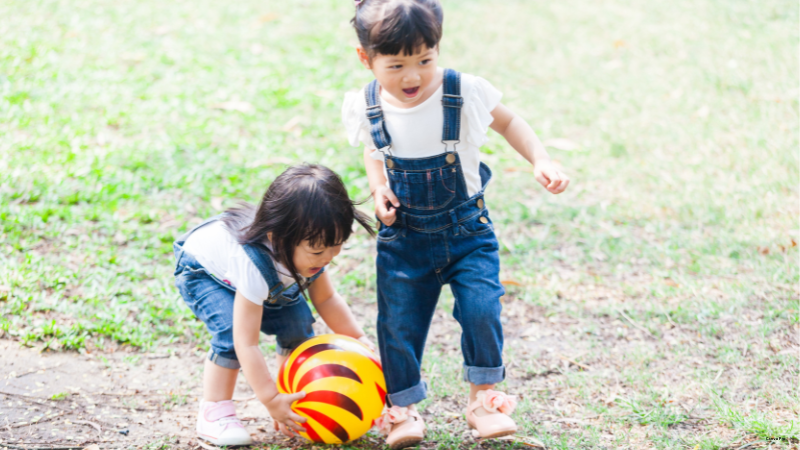Toddler 2-3 years: Navigating milestones, fostering independence, ensuring safety, and building healthy foundations during this transformative developmental stage.
Developmental milestones
Toddler 2-3 years typically master developmental milestones, including taking turns with playmates, engaging in imaginative play, and demonstrating physical skills like kicking balls. Most children achieve these milestones by a certain age; however, it’s essential to remember that each child develops at their own unique pace. Children reach milestones in how they play, learn, speak, behave, and move (such as jumping, running, or balancing), and these achievements serve as important indicators of their overall development.
The “terrible twos” is a term used to describe this stage as toddlers begin to assert their independence. However, this can be an exciting time as toddlers undergo huge changes in their thinking, learning, social, and emotional abilities. These changes help them explore their new world and make sense of it. At this stage, toddlers should be able to follow simple instructions and sort objects by shape and color. Additionally, they should be able to imitate the actions of adults and playmates, and express a wide range of emotions, from joy and excitement to frustration and anger. This period marks a crucial phase in their emotional development and self-awareness.

Positive parenting tips
These are some of the things you, as a parent, can do to help your toddler during this time:
- Set up a special time to read books with your toddler, making it a daily routine that fosters language development and creates lasting bonds.
- Encourage your child to take part in pretend play, which helps develop creativity, problem-solving skills, and social understanding.
- Help your child to explore things around them by taking them on a walk or wagon ride, pointing out interesting objects and encouraging curiosity about their environment.
- Encourage your child to tell you their name and age, helping them develop self-awareness and communication skills.
- Teach your child simple songs like Itsy Bitsy Spider, or other cultural childhood rhymes, which aid in language development and memory skills.
- Give your child attention and praise when they follow instructions and show positive behaviour, and limit attention for defiant behaviour like tantrums. Teach your child acceptable ways to express their emotions, helping them develop emotional regulation skills.
You may also read: Infant Developmental Milestones: What to Expect Year One
Child safety first
As your child moves around more, they will encounter more dangers as well. Dangerous situations can happen quickly, so keep a close eye on your child. Here are a few tips to help keep your growing toddler safe:
- Encourage your toddler to sit when eating and to chew their food thoroughly to prevent choking, making mealtimes both safe and enjoyable learning experiences.
- Check toys often for loose or broken parts, ensuring all play items are age-appropriate and well-maintained.
- Encourage your toddler not to put pencils or crayons in their mouth when coloring or drawing, teaching them proper use of art materials.
- Do NOT hold hot drinks while your child is sitting on your lap. Sudden movements can cause a spill and might result in your child being burned, potentially causing serious injury.
- Make sure your child sits in the back seat and is buckled up properly in a car seat with a harness, following all current safety guidelines for child car seats.
You may also read: Nurturing Your Baby’s Development, Safety & Healthy Growth
Healthy bodies
Here are a few tips to help keep your growing toddler healthy, ensuring they develop strong physical foundations and maintain good health throughout their early years.
- Engage in detailed conversations with your childcare provider’s staff about their nutritional policies and practices. Discuss the types of meals and snacks they serve, ensuring they align with healthy eating guidelines for toddlers. Also, inquire about their screen time policies, including how they manage television, tablet, and other digital device usage during care hours. Request information about their daily schedule to understand how they balance educational activities with entertainment-based screen time.
- Understanding your toddler’s changing food preferences is crucial during this developmental stage. It’s completely normal for toddlers to be enthusiastic about certain foods one day and refuse them the next. Rather than creating tension around mealtimes, adopt a patient and encouraging approach. When introducing new foods, offer small, manageable portions that won’t overwhelm your child. Make the experience fun and pressure-free by allowing them to explore different textures and flavors at their own pace. Consider presenting new foods alongside familiar favorites to increase acceptance.
You may also read: Early Childhood Development and Parenting: Shaping Personality
- Prioritize unstructured play time in your toddler’s daily routine. Free play is essential for physical development as it allows children to naturally explore their capabilities and limits. This type of unrestricted activity helps strengthen muscles, improve coordination, and develop crucial motor skills. Whether indoors or outdoors, ensure your toddler has ample space and opportunities to run, climb, jump, and engage in spontaneous physical activities that interest them.
- Establishing proper sleep patterns is vital for your toddler’s growth and development. For children aged 2-3 years, aim for 11-14 hours of sleep per 24-hour period, including daytime naps. Create a consistent bedtime routine that helps your child wind down and prepare for rest. This might include activities such as reading stories, gentle music, or quiet playtime before bed.
Source:
US Centres for Disease Control and Prevention (August 5, 2025). Positive Parenting Tips: Toddlers (2–3 years old). https://www.cdc.gov/child-development/positive-parenting-tips/toddlers-2-3-years.html. Accessed September 11, 2025
#Toddler_development_milestones_2-3_years, #Positive_parenting_techniques_for_2-year-olds, #Emotional_regulation_for_toddlers_age_2-3, #Toddler_safety_tips_for_parents, #Healthy_eating_habits_for_2-3_year_olds, #Sleep_routines_for_toddlers_2-3_years, #Managing_the_terrible_twos_behavior, #Toddler_language_development_activities, #Pretend_play_importance_for_2-year-olds, #Child-proofing_home_for_active_toddlers, #Car_seat_safety_guidelines_for_toddlers, #Toddler_nutrition_needs_2-3_years
